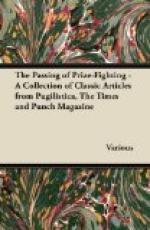We’ve had our difference, as
lovers do;
A slight misunderstanding came between us;
But that is past; the sky (I said) is blue
And this the very sea that nurtured Venus;
Come, like her doves amid the groves of myrtle—
Come, let us turtle.
“How can they ever kiss again?”
’twas said;
But Love made light of that absurd conundrum;
And lo! your breast is pillow to my head,
And we’ve a pair of hearts that beat as
one drum;
Our bonds, if anything, are even more
Tight than before.
Your independence caused a passing
pain,
But now, I thank you, I am feeling better;
You’ll never go upon your own again
Nor I will write another nasty letter;
Embrace me, then, for sign of love’s renewal,
Mon bijou (jewel).
O.S.
* * * * *
The identification of Hobbs.
Old Hobbs, the gardener, has been in our family longer than I have. Although we live within twenty miles of London only once has he made the journey to the great city, for that one memorable day so nearly ended in disaster that he always speaks of it with a shudder. Indeed, but for the arrival of Mrs. Hobbs, belated, flustered and inquiring everywhere for her man, he must assuredly have spent the night in a police-station.
This is how it all happened. Mrs. Hobbs was returning from a visit to relations in Sussex, and her husband was to meet her in London, convoy her across the city and bring her home. In order to avail himself of a cheap fare Hobbs left by the 7.30 train, though his wife would not arrive till four o’clock in the afternoon.
He managed to get across London somehow. After locating the station at which Mrs. Hobbs was to arrive his intention was to spend the day “looking round London a bit;” but the crowds and the traffic were too much for the old countryman, so he sought safety by staying where he was.
Time hung heavily after a while. He lingered round the bookstall looking at the books and papers till a pert girl behind the counter asked him if he wouldn’t like a chair; but when Hobbs, who was never rude and consequently never suspected rudeness in other people, raised his hat and said, “No, thank’ee, Miss, I be all right standing,” even the pert girl was disarmed.
Next he amused himself counting the milk-churns on the platform. Then he killed time by interesting himself in the stacks of unattended luggage and examining the labels; and at three o’clock a railway policeman laid a hand on his shoulder and asked him what his game was.
Hobbs, a little startled but clear in conscience, told his tale.
“That don’t do for me,” announced the constable. “I been keeping observation on you since nine, and your wife don’t arrive till four, so you say. I seen you hanging round the luggage and fingering parcels, and you’ll just come with me to the police-office as a suspected person loitering. An old luggage-thief, I should say, to put it quite plain.”




